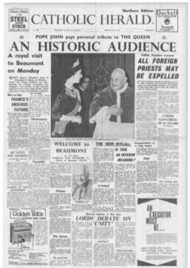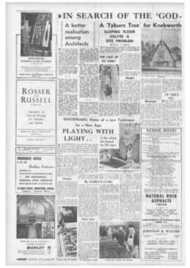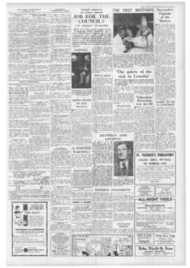Page 4, 12th May 1961
Page 4

Report an error
Noticed an error on this page?If you've noticed an error in this article please click here to report it.
Tags
Share
Related articles
Catholics And Rotary : Denial
Spain
" Enough Crosses In The Cemeteries Already"
" La Croix" Again Attacked
Paris Archbishop Says:
Parisian Parable
THE French writer, DanelRops, reports in Lis Croix a conversation he had with a Far-Eastern visitor to Paris.
This visitor was deeply shocked by much of what he had seen in France's capital, but perhaps the most striking conversation he had had was with a good Christian mother who nevertheless sent her young children to Soviet films rather than American or European ones.
She explained: "I send them to Communist films because those are the only films where one may be certain that the children will not see halfdressed women and long intimate kisses. I feel that a false political propaganda will harm my children less at their age than the immorality displayed in the films of the free world."
TT may be that one needs to
get a shock like that to appreciate how our society has slowly become inured to increasingly low moral standards in the fields of entertainment and reading—so inured that one hardly realises what has been happening. Alas, the fact that we take the situation for granted is no guarantee that our spiritual and moral fibre, not least where the young are concerned, is proof against a corruption the consequences of which are seen in, a failure to respond to and tackle the challenge of Christian life.
Yet it is true that the negative tactic of prohibition and censorship is very far from being the full answer. It is doubtful even whether the supersession of corrupting entertainment by highprincipled entertainment can be the answer. If these were the answer, then we should have acknowledged that Communism is better than the freedom of the West.
We suggest that the true line of answer is to be found in Christopher Dawson's new book "The Crisis of Western Education" where he writes that the Western world "has become so deeply secularised that it no longer recognises any common system of spiritual values, while its philosophers have tended to isolate the moral concept from its cultural context and have attempted to create an abstract subjective system of pure ethics."
Oddly enough, Dawson's accusation against Western society, namely that its code of behaviour has become divorced from the historic culture and values of the West, might surely be applied in a minor way to ourselves as Catholics.
We too, in practice, tend to detach our moral teaching and practice from both the great spiritual realities and the wonderful history of God's Word incarnated in our culture.
Censorship and prohibitions, however well-founded and useful in the short-term will never of themselves draw us away— and still more draw our young people away-from the immensely strong pressure of contemporary corruption in all its manifestations. And even if it did, the result would be negative and inhuman.
JUST as the future health of the Western world demands, as Dawson suggests, a return to all the springs and sources of our tradition of accomplishment through freedom, so we as Catholics, in a special and intense measure, need to integrate and strengthen our moral purposes and growth in our spiritual, moral and historical heritage.
It was Mgr. Cardijn who said that he owed his apostolic vocadon to the evenings he spent with his mother when, as a small child, he listened to her telling him the story of the Scriptures and of the great feasts of the year.
He emphasised that his was a simple, untutored Flemish home. Yet that home started the career of one of the greatest apostles of our day.
Until we can get hack in home and school to the awakening of children and adolescents to appreciate the Catholic heritage and the consequent Catholic vocation, we, no more than the Western free world as a whole, will be able to overcome the decadence and temptations of our times and help lead the free world back to moral sanity and spiritual idealism.
To put it bluntly, only so shall we, in the first place, and the people of the West, in the second, begin to realise what is involved in having been created in God's image and made partakers of the divinity which Christ's death and resurrection have earned us.
blog comments powered by Disqus











